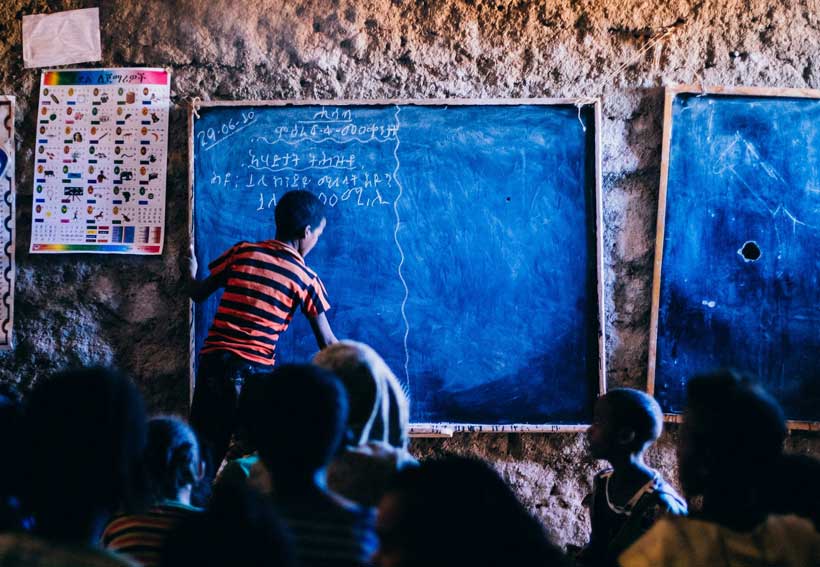Providing everyone with the opportunity to learn how to read and write. It sounds basic and yet, more than twenty years into the 21st century, the world is still far from achieving this goal.
Today one out of seven adults, 765 million people, still lack basic literacy skills. Two thirds of these illiterate adults are women.
Literacy is a vital skill and a driver of personal and social development. In the 21th century the ability to read is central to understanding, let alone participating in, the world around us.
Literacy empowers individuals, improves livelihoods, enables greater participation in society and the labour market, benefits child and family health and nutrition, and reduces poverty.
Mass illiteracy has serious consequences, including for a country’s security. A lack of educational opportunities and high rates of literacy increase the risk of extremist ideologies. The Sahel is a case in point. With the highest illiteracy rates in the world, the extremist insurgency gripping the region attracts a growing population of disaffected young people who have been denied the opportunity to go to school.
Poverty and illiteracy tend to go hand-in-hand. The average literacy rate of the least developed nations is only 65%, compared to near 100% adult literacy in developed countries.
A renewed commitment to universal literacy is needed to turn this dire situation around and International Literacy Day provides us with the opportunity to put that commitment into action.
First, ensure children go to school!
More than twenty years after the adoption of the Millennium Development Goals, in which the world promised to ensure every child would complete a full course of primary education, 250 million children are still out of school. In Africa that’s one in every five children of primary school age.
To make matters worse, one in three African children does not complete primary school on time and one in four never will.
The failure to ensure every child completes basic education has various reasons: but conflict, displacement, extreme poverty and a lack of teachers and infrastructure are among them, all of which need more attention, including from the EU.
We need to face up to the fact that the promise to ensure that every child completes primary school is an unfinished business and we need to commit to finishing it.
Access isn’t enough
However, even if we ensure that every child enrols in and even completes primary school, which we must, access to school won’t solve the problem on its own.
Only one in five children who reach the end of primary school in Africa – and remember a quarter never will! – achieve a minimum proficiency level in reading.
This doesn’t just deprive these children of an essential skill, it robs their countries of the citizens required to develop their societies and grow their economies.
Massive efforts are needed to improve the quality of education, with more and better trained teachers at its heart.
By 2030 an additional 68.8 million teachers need to be trained and employed in order to expand access and replace those leaving the workforce.
Students also need books and learning materials. Having their own textbook can increase a child’s literacy scores by up to 20%, but at best one is shared between every three children on the continent.
Measure learning
Any effort to ensure that every child learns must also be informed by accurate, reliable, and comparable data. However, there is no data on the learning levels of two-thirds of African children.
Strong and reliable data on learning will be key to progress, so we must work together to support more countries to collect, analyse and report on learning data.
Close the education funding gap
The extent and severity of the crisis in foundational learning across Africa, coupled with the serious fiscal constraints that governments face, can appear overwhelming.
For good reason. 21% of the funding required to provide accessible, inclusive quality education is missing.
At the 2021 Global Education Summit 20 Heads of State from low and middle income countries pledging to work towards spending at least 20% of national budgets on education over the next five years by rallying behind a declaration on education financing led by the then President of Kenya, Uhuru Kenyatta.
Donor funding has an important part to play but we need to drastically improve how it is provided.
Across Africa churches and other faith-based actors are often covering the gap where the states come up short in providing basic social services like education. This is particularly true in conflict affected areas where the state is simply not able to meet basic needs. Local actors are taking this responsibility and churches are prominent among them.
International actors, like the EU, need to partner with them in providing universal quality education.
The political commitment of the European Commission under Commissioner Urpilainen, to dedicate at least 10% of the EU’s development budget to education is promising.
Our hope is that other donors will follow the EU’s lead by meeting or even bettering this commitment.
With a new Commission in place the European Parliament, which supported the commitment via the adoption in plenary of a report on Eu aid to education, will be working to ensure the Commission delivers.
International Literacy Day, which the international community marks on September 8, is the perfect moment to shine a light on how far we are from a world in which everyone can read and write.
But more importantly, just weeks before the UN Summit of the Future later this month, it invites us all to recommit to the promise of quality education for all, which guarantees everyone – both children and adults – the opportunity and freedom that comes from literacy.
